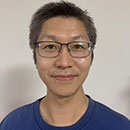Zane Zheng, Ph.D.

Degrees:
- Ph.D., Queen’s University
- M.A.Sc., McMaster University
- M.Sc., Queen’s University
- B.E., Wuhan University
Courses:
PSYC101 Psychological Perspectives
MDSC203 Drugs & the Human Body
PSYC302 Biological Basis of Behavior
PSYC304 Sensation and Perception
PSYC 306 Special Topics: Perception
PSYC323 Brain Function & Dysfunction
PSYC328 Cognitive Processes
BIO340 Research Methods
Biography:
Professor Zane Zheng is a cognitive neuroscientist who joined Lasell University as an Assistant Professor of Psychology in 2012. He was promoted to Associate Professor and Chair of Academic Research in 2019 and then to Professor of Psychology in 2024. His research focuses on exploring the cognitive and neural mechanisms underlying speech perception and self-awareness.
Professor Zheng’s teaching is guided by evidence-based pedagogy and his proprietary instructional model, DATE (Doing, Acting, Thinking, and Extending), which engages students in deep learning and helps them build transferable skills through consolidation. His dedication to education and research has been recognized with awards and grants from the American Psychological Association, the Association for Psychological Science, the National Science Foundation, the Society for the Teaching of Psychology, the Society for Personality and Social Psychology, the Society for the Psychological Study of Social Issues, and Psi Chi.
Professor Zheng is passionate about involving students in research and is committed to training them in rigorous research practices (www.lasell.edu/researchexcellence). His students have consistently received departmental research awards for their collaborative work.
In addition to his roles at Lasell, Professor Zheng is actively involved with Psi Chi, the International Honor Society in Psychology. He currently serves as the Research Director of Psi Chi and has been honored with Psi Chi's most prestigious award, the Florence L. Denmark Faculty Advisor Award, in 2023. Through his involvement, he continues to promote excellence in the science and application of psychology.
Do you have a blog/website you'd like visitors to Lasell.edu to visit?
www.zzhenglab.com
Do you have any publications you would like students to be made aware of?
Zheng, Z*. (in press). A shared perceptual inference for cross-modally induced illusions of self-attribution. Psychology of Consciousness: Theory, Research, and Practice.
Bouffard, S., Giglio, D., & Zheng, Z*. (2022). Social media and romantic relationship: excessive social media use leads to relationship conflicts, negative outcomes, and addiction via mediated pathways. Social Science Computer Review. 40: 1523-1541.
Fahey, S., Santana, C., Ritada, R., & Zheng, Z*. (2019) Affective judgement of social touch on a hand associated with hand embodiment. Quarterly Journal of Experimental Psychology. 72: 2408-2422.
Fahey, S., Charette, L., Francis, C., & Zheng, Z*. (2018) Multisensory integration of signals for bodily self-awareness requires minimal cognitive effort. Canadian Journal of Experimental Psychology, 72:244-252.
Boisvert, B., Montepare, J., & Zheng, Z*. (2015). Age-related differences in the perception of body ownership. Proceedings of the Association for Psychological Science. (2nd poster award at Massachusetts Gerontology Association Annual Convention)
Zheng, Z*., Vicente-Grabovetsky, A., MacDonald, E., Munhall, K., Cusack, R., & Johnsrude, I*. (2013). Multivoxel patterns reveal functionally differentiated networks underlying auditory feedback processing of speech. Journal of Neuroscience. 33: 4339-48.
Zheng, Z*., MacDonald, E., Munhall, K., & Johnsrude, I. (2011). Perceiving a stranger's voice as being one's own: a 'rubber voice' illusion. PLoS One. 6:e18655.
Zheng, Z*., Munhall, K., & Johnsrude, I. (2010). Functional overlap between regions involved in speech perception and in monitoring one's own voice during speech production. Journal of Cognitive Neuroscience. 22:1770-1781.
